President Steger steps down
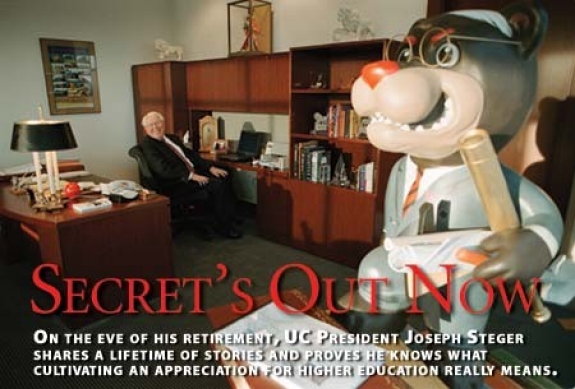
"Joey" was a high school "sweathog." And Joseph Steger readily admits it, as if Sweat Hog 101 were a basic requirement for any university president. "Besides playing football, I hated high school. I took shop and phys. ed., and read 'Moby Dick' as a Classic Comic book," the University of Cincinnati president says, so matter-of-factly that he doesn't even grin.
Despite the initial shock of the statement, there's something comforting in his confession -- like knowing that your banker once bought thrift store clothes or that your teacher is dyslexic. And the tale of Steger's climb from the locker room to the president's box is full of red-faced moments, dirt under the fingernails and helping hands along the way.
Although his secondary education hardly seemed to destine him for college, young Steger later took the advice of an Air Force warrant officer who suggested coupling college with military reserves after he left active duty. Using all the careful consideration that admissions officers hope prospective students might employ, young Steger took a map, circled all the colleges within 300 miles of his hometown of Philadelphia and mailed letters to a few, saying he was "a very mature person in the Air Force."
Gettysburg College accepted him. "They didn't have SATs back then," he points out, as if obligated to explain.
That fall, the new student faced a big surprise, especially when he had to write a 500-word paper in freshman comp. "I had never written 25 words before," Dr. Steger says, giving in to a familiar chuckle.
After assignments were graded, the professor asked to see Mr. Steger after class. "There's hardly a complete sentence in this whole paper," Professor Glatfelter noted. "What's a complete sentence?" the student asked.
Glatfelter instructed Steger to report to his office for private tutoring. It wasn't an offer; it was an order.
Weekly lessons continued through the end of the term when the grateful student received a D, but anxiously anticipated resuming normal study habits just the same. His instructor had other ideas. Lessons continued until Steger had a C by the end of the year.
"If he hadn't done that, I don't know what would have happened," the president says. "Everything you do in college depends upon writing. Later I went back and thanked him for changing my life."
From comic books to psychophysics
When Joseph Steger talks about his professor changing his life, it is a vast understatement. The "Classic Comics" reader did a 180-degree about face and revved into high gear. He became entranced by psychophysics, landed a graduate scholarship, followed a faculty member halfway across the country, earned his PhD a year early and set his sights on becoming the president of a university.
In 1984, that dream came true when he was inaugurated as UC's 20th president, after serving as provost for two years.
The job was a call back to academics for a man who had been a dean, vice president and acting provost at Rensselaer Polytechnic Institute in New York, but was currently working at Colt Industries as director of organizational development and human resources. "I always wanted to be a president of a university," Steger says, "even though I didn't go seeking it.
"I went in to talk to my boss at Colt, and he said, ‘I'll tell you what; you go out there and play in the sandbox for two years' -- that's how higher education is viewed by a lot of executives -- ‘and if you then don't get that job, you can come back.'"
Two years came and went. Many times. But not without other offers.
"I've been asked to consider other presidencies," Steger says, "but I never saw any I thought were as challenging as this one. I never saw one that I thought would be more exciting than this because, working together, we've changed the whole place."
"UC's excellence is the result of many outstanding faculty and staff, but leadership starts at the top," says James Votruba, president of Northern Kentucky University for the past six years. "Joe Steger has always believed in UC and its capacity to accomplish great things, many of which have been achieved during his watch. He has been a good steward, and he leaves a fine institution."
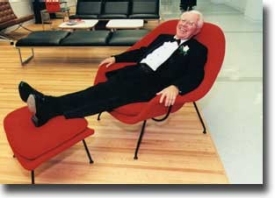
At the opening of the Aronoff Center for Design and Art, Dr. Steger tried out the new furniture. Photo/Lisa Ventre
The fact that Steger remained here 19 years surprised everyone, including himself. After all, a typical university president's tenure is only four to five years.
From the beginning, he knew he would need seven to 10 years to accomplish what he wanted. What he failed to precisely calculate, however, was how slow universities move and how expansive dreams could grow. After nearly two decades, he concedes, "This job's never done."
Nevertheless, it is done -- for him, at least. Last November, Steger decided that serving as the university's second-longest-sitting president is long enough. (Raymond Walters remained in office 23 years, 1932-55.) "It is time for a change," he says. "I am seeing the same things over and over.
"I can let others take over now. I've done everything I planned to change the nature of the institution in terms of quality. This is a different place now."
"At a time when university presidents come and go," adds James Votruba, president of Northern Kentucky University, "Joe Steger stayed long enough to make a difference. In his years as president, he has led UC to the ranks of this nation's premier research universities. Today, the impact of UC's research and scholarship reaches around the globe." Ohio Gov. Bob Taft, JD '76, agrees: "UC has advanced to one of the finest research and teaching universities anywhere in the U.S.""UC ... one of the finest universities in the U.S."
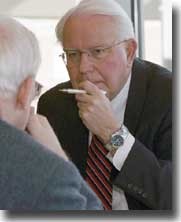
Photo/Lisa Ventre
Steger's resignation took effect July 1, but the board of trustees asked him to remain until his successor arrives. Even then, he won't be going far. He has accepted a faculty position at the College of Business Administration, where he intends to create a center for nonprofit organizations.
Furthermore, he won't waste any time in getting started. Accustomed to working 12- to 16-hour days nearly seven days a week, he decided that for a sabbatical he would head right over to the business college to develop the center's mission and strategy, recruit staff and explore options with various foundations. "Once all of that is up, I can get it rolling," he says.
Why doesn't he take a little time off? "I'd be bored to death," the inexhaustible 66-year-old states without a moment's hesitation.
His wife, Carol, confesses she managed to get him to promise to spend a month -- well, at least three weeks -- at the Michigan vacation home that they built but rarely visit. Other than that, she says, she will be glad to simply have dinner with him several nights a week.
"Carol and I would go weeks at a time without having dinner at home together," he acknowledges. "It's a hard job. Almost everything Carol and I do is related to the University of Cincinnati. Even travel is always related to fund raising or athletics.
"If you don't make a 100 percent commitment to the job, though, you can't get it done. This place is too big."
"He always puts the university first," says Lynn Schnirring, the president's office executive director. "He averages six to nine UC-related meetings a day, not counting meetings for the boards he serves on; 120 weekend/evening events a year; and 20 annual UC trips. I think that proves the point."
In retrospect, the job commitment was larger than he expected. Fortunately, it was not a total surprise because he had already served as UC's provost for two years. That experience introduced him to personalities, procedures and policies, thus creating a smooth transition into the presidency.
He graciously thanks Norm Baker, an old friend and CBA department head at the time, for the wisdom in seeing that connection. Baker knew that current President Henry Winkler would be stepping down in two years and that a new provost might be in the right place at the right time.
When Joseph Steger took office as president in '84, he and the UC Board of Trustees developed goals that would require "taking chances in innovation," as he puts it. Dale McGirr, vice president of finance, recalls him saying, "Management isn't about avoiding risk, but about taking the right ones.Willing to risk changes
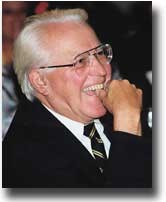
Photo/Lisa Ventre
The signature architect program is one example. "Everyone said it was goofy," Steger remarks, "but it only drove costs up by 1.5 percent, and that 1.5 percent gave us tremendous publicity, including the New York Times and the Washington Post. Now people are flying in just to see the campus."
McGirr finds that news exciting. "When we are a destination, visitors will find other things, engage in other activities, and that will be to our benefit," he says.
While publicity and tourism are nice, they were not the Master Plan's main concern. Steger basically thought the campus was ugly.
"You can't put good people in bad places and expect them to excel," McGirr adds. "Joe's dedication to that concept has been extraordinary and unshakable."
"Dr. Steger had the foresight to develop a Campus Master Plan and the courage and tenacity to see it through to completion despite severe budget restrictions and considerable on-campus criticism," provost emeritus Norm Baker says. "The campus as a whole has become more student and visitor friendly.
"But it is not the buildings and grounds themselves that are important; it is the activities that take place in the buildings and on the grounds. UC would not be a modern campus positioned for modern education and research if Dr. Steger had not stayed the course in implementing the Master Plan."
Steger likes it when people see that big picture. "Everyone talks about the buildings we put up, but those aren't buildings," Steger says. "I call them enabling places. If you don't have them, you're not going to get the best faculty."
Going after the best
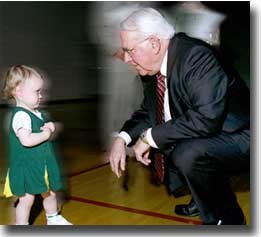
Steger always has time for young people. While the donors for the Varsity Village waited, he stooped to say hello to the event's youngest attendant, Addison Fagan, daughter of Tabby Fagan, UC's head coach for cheerleaders. Photo/Lisa Ventre
Recruiting talent was next on the list for the UC president. "We want our students to be in the classroom with the faculty member who wrote the book, not the one that merely read it," Joe Steger says. "The faculty is really excellent today, and the quality of our students is accelerating because they follow the faculty."
Other goals through the last two decades focusedon globalization, research and fund raising. Steger checks each off as a success.
"Globalization occurs every day," he says. "Plus we're up to $260 million in research. And we changed fund raising completely" — reorganizing the UC Foundation Board, operating the foundation as a separate corporation, using alumni to cultivate peers and taking the endowment from $140 million to $1.03 billion.
"It's down now because of the market," he says, "but nobody believed we would raise that kind of money. Even now, the Chronicle of Higher Education places our endowment at 14th in the nation among public universities."
He quickly shares any credit with numerous past and present vice presidents, administrators and deans. "We had some good leadership," he says. "Some of the stability comes from that. It makes a big difference."
He also compliments a wider UC community for rising to the challenges. "People here have embraced the future. The rate that the faculty, board, staff, donors and everyone understood that exceeded my expectations."
Despite the positive advances, President Joseph Steger says the university faces a serious challenge. "It's a real shame, but the state provides less than 24 percent of our income now (compared to nearly 39 percent when he started).
"In the 21 years I've been here, the state has caused us to cut our budget every year but about four. Budgets are the most dreaded job, and when you're always cutting them, it's not pleasant."
Fortunately, the job was full of things that he did find pleasant, students most of all. "Being around young people keeps you young," he says. "Carol and I love young people."
One hopes to hear a university president say that, but Steger demonstrates it, not only attending student events, but also creating opportunities to just spend time with them. Every few weeks, for example, he wanders over to the dining pavilion, orders a hoagie and asks a group of students if he can sit with them.
"Most of the time, they look at me kind of funny," he snickers, "but say, 'Sure.' They don't know who I am because they don't interact where I interact. Typically, when I start talking, another student will come by and say, 'Hey, that's the president.'"
Dr. Steger's days can begin with a 7:30 a.m. event such as a student breakfast and conclude 13 hours or more later with a student reception. "You've got to keep in touch with your students because the generations change," the president says. "Every year, when we get a new freshman class, you get to find out how they think. They're enjoyable to be with."Making it work
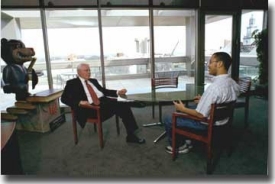
Dr. Steger and student body president Darren Tolliver in one of their regular meetings. Photo/Lisa Ventre
He maintains regular communication with one student in particular, student body president Darren Tolliver. When he walked into the president's office on the morning of this interview, Steger broke into a big grin and chided Tolliver about dressing so casually, clearly not a habit for the political-science senior.
As Tolliver began stammering, Steger wrapped an arm around his neck and jokingly gave a tug, looking much like an Uncle Joe hassling his favorite nephew. When Tolliver left 20 minutes later, it seemed natural when he gave his adopted uncle a good-bye hug.
"I see and talk to Dr. Steger often," Tolliver says, "and I know I'll get straight talk with no beating around the bush. He has been a strong supporter of Student Government and has always been open and honest with any student questions or concerns. And I'm impressed with the in depth knowledge he has about many aspects of the university, even ones I wouldn't think he would pay attention to."
The University of Cincinnati has been as close to a perfect fit as any university president could hope for, Steger says. "At the University of Cincinnati, we can see operas, we can see fashion shows, and we have great medical care -- all right here. I've met leading inventors, world famous authors and prominent athletes. I was able to travel internationally, representing the university.
"I couldn't have had a better job. This is perfect. We made the right choice of where to go. I've had a lot of fun."
Following in Steger's footprints will be a challenge for the next president, says Ohio State University president Karen Holbrook: "He has been a significant part of the legacy of a great university, and this will be clear when the quality of candidates who want to follow him is revealed."
NKU's president James Votruba concurs, "Leaders build, managers maintain. From my vantage point, President Steger has been a leader.
"There is no single institution more important to the future of our area than UC. Through its cutting-edge research, its high-quality instruction and its involvement in addressing issues of public concern, the university will influence every dimension of our region's future.
"Joe Steger understood this. The next president must understand it, as well."
Steger's new center for nonprofits
Steger's view on today's youth
Steger’s colorful college memories
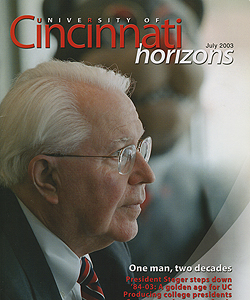
 Past Issues
Past Issues